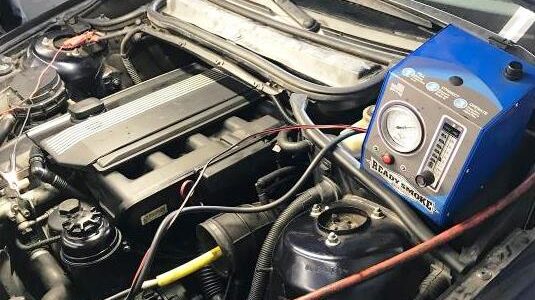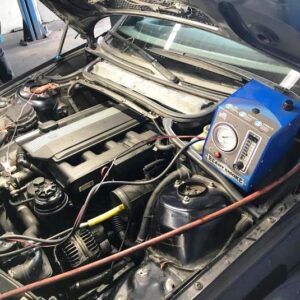
Welcome to Last Chance Auto Repair, your go-to destination for comprehensive emissions diagnostics and testing in Plainfield, IL. In this guide, we’ll delve into the intricacies of Leak Detective 101, providing a step-by-step walk-through for mastering EVAP smoke tests.
Are you in need of an EVAP smoke test? Our commitment is to offer you expert insights, unmatched service, and a hassle-free emissions testing experience. If you need service give us a call, schedule an appointment, and consider done. Otherwise, sit back, relax, and let the educational knowledge start flowing.
Leak Detective Class Is In Session: A Comprehensive Overview
Emissions repair expert Last Chance Auto Repair, is your trusted partner in automotive excellence in Plainfield, IL! Today, we’re delving into the world of emissions diagnostics, specifically focusing on the indispensable EVAP smoke test. Understanding the importance of emissions testing and the role of a smoke machine in this process is crucial for maintaining optimal vehicle performance and adhering to environmental regulations.
Why Emissions Testing Matters:
Emissions testing plays a vital role in ensuring that vehicles comply with environmental standards. By identifying and addressing emission issues early on, we not only contribute to cleaner air but also prevent potential damage to the vehicle’s components. At Last Chance Auto Repair, we take emissions testing seriously to keep your vehicle running smoothly and minimize its impact on the environment.
The Basics of Emissions Testing:
Before we dive into the intricacies of EVAP smoke tests, let’s briefly review the fundamental aspects of emissions testing. Typically, emissions testing assesses the levels of harmful pollutants released by a vehicle into the atmosphere. This process is crucial for identifying issues that may affect the vehicle’s performance and environmental impact. If you did fail your emissions test and need an EVAP smoke test performed in order to determine the culprit at hand, you can count on our emissions repair experts at Last Chance Auto Repair.
Understanding EVAP Systems:
EVAP, or Evaporative Emission Control System, is a critical component in modern vehicles designed to prevent the release of fuel vapors into the atmosphere. The system captures and stores these vapors in a charcoal canister, later purging them back into the engine for combustion. If there’s a leak in the EVAP system, it can lead to increased emissions and potential drivability issues.
The Role of EVAP Smoke Tests:
Now, let’s explore the Leak Detective’s tool of choice – the EVAP smoke test. This diagnostic method involves introducing smoke into the vehicle’s EVAP system to detect leaks. As the smoke escapes through any potential openings, technicians can pinpoint the location of the leak and address the issue promptly.
Step-by-Step Guide to Mastering EVAP Smoke Tests:
- Preparation: Before initiating the EVAP smoke test, it’s essential to ensure that the vehicle is in a well-ventilated area. The engine should be cool, and safety precautions, such as wearing protective gear, must be observed.
- Connect the Smoke Machine: Attach the EVAP smoke machine to the vehicle’s EVAP system, typically through the service port. This connection allows smoke to flow into the system, highlighting any leaks.
- Pressurize the System: Gradually pressurize the EVAP system with smoke. This step helps replicate the conditions the system experiences during normal vehicle operation, making leaks more apparent.
- Inspect for Escaping Smoke: Thoroughly inspect the vehicle for escaping smoke. Pay close attention to hoses, connectors, and components associated with the EVAP system (Evaporative Emission System). The smoke will reveal the location of any leaks present if there is a leak.
- Address Identified Leaks: Once leaks are identified, our experienced technicians at Last Chance Auto Repair will determine the best course of action (plan of attach) for the needed repairs. This may involve replacing damaged components, tightening connections, or repairing hoses.
- Re-Test and Verify: After addressing the identified leaks, re-conduct the EVAP smoke test to ensure that the system is now airtight and leak free. This step is crucial for confirming the effectiveness of the repairs, preventing future issues and any possible comebacks.
Get Your Emissions / EVAP System Diagnosed At Last Chance Auto Repair
At Last Chance Auto Repair, we understand the importance of emissions testing and the role of EVAP smoke tests in maintaining a clean and efficient vehicle. Our skilled technicians are well-versed in the intricacies of emissions diagnostics, ensuring that your vehicle complies with environmental standards while performing optimally on the road. Trust us for all your automotive needs in Plainfield, IL, and let us keep your vehicle running smoothly while contributing to a cleaner, healthier environment.
For more information on emissions testing and our services, contact Last Chance Auto Repair today!
Learn more about our emissions repair services:
www.lastchanceautorepairs.com/auto-emissions-repair-plainfield-naperville-bolingbrook-il/
EVAP Smoke Testing FAQs
Q: What is EVAP smoke testing?
A: EVAP smoke testing is a diagnostic procedure used to identify leaks in the evaporative emission control system of a vehicle. It involves introducing a smoke-like vapor into the system to pinpoint any leaks that may be contributing to increased emissions.
Q: Why is EVAP testing important?
A: EVAP testing is crucial for identifying and repairing leaks in your vehicle’s emissions system. Leaks can lead to increased pollution and can cause a vehicle to fail it’s emissions test if applicable. Fixing these issues helps maintain optimal engine performance and ensures compliance with environmental regulations.
Q: How does EVAP smoke testing work?
A: During EVAP smoke testing, a non-toxic smoke is introduced into the EVAP (Evaporative Emission System) system. This smoke makes it easier to detect leaks by escaping through any openings. Technicians over at Last Chance Auto Repair use specialized equipment to trace the smoke and locate the source of the leaks in order to resolve the problem at hand.
Q: Is EVAP smoke testing environmentally friendly?
A: Yes, EVAP smoke testing uses a non-toxic, environmentally safe smoke. The procedure is designed to be eco-friendly while effectively identifying and resolving issues within the vehicle’s emissions system.
Q: When should I consider EVAP smoke testing?
A: If your vehicle is failing emissions tests, experiencing a decrease in fuel efficiency, or showing a check engine light related to the EVAP system, it’s advisable to consider EVAP smoke testing.
Q: How long does EVAP smoke testing take at Last Chance Auto Repair?
A: The duration of EVAP smoke testing can vary based on the complexity of the system and the extent of the issues. On average, it takes approximately 1-2 hours, but our experienced technicians at Last Chance Auto Repair work efficiently to minimize downtime.
Q: Can I drive my car immediately after EVAP smoke testing?
A: In most cases, you can drive your car immediately after getting an EVAP smoke test. Technicians should ensure that the EVAP system is securely sealed after testing. However, specific recommendations may vary based on the nature of repairs performed.
Q: How often should I have EVAP smoke testing done?
A: While there is no strict schedule for EVAP smoke testing, it’s recommended when issues are suspected. If you notice changes in fuel efficiency or emissions-related warning lights, it’s advisable to schedule EVAP testing ASAP.
Q: Is EVAP smoke testing covered by my vehicle warranty?
A: Coverage can vary depending on your vehicle’s warranty. It’s advisable to check your warranty documentation or contact the manufacturer to determine if EVAP smoke testing is covered.
Q: How do I schedule EVAP smoke testing at Last Chance Auto Repair?
A: Scheduling EVAP smoke testing at Last Chance Auto Repair is easy. Simply contact our service center by phone or through our website to book an appointment. Our friendly staff will guide you through the process and answer any additional questions you may have.
EVAP Smoke Test Resources: EVAP Smoke Testing | Emissions Repair

